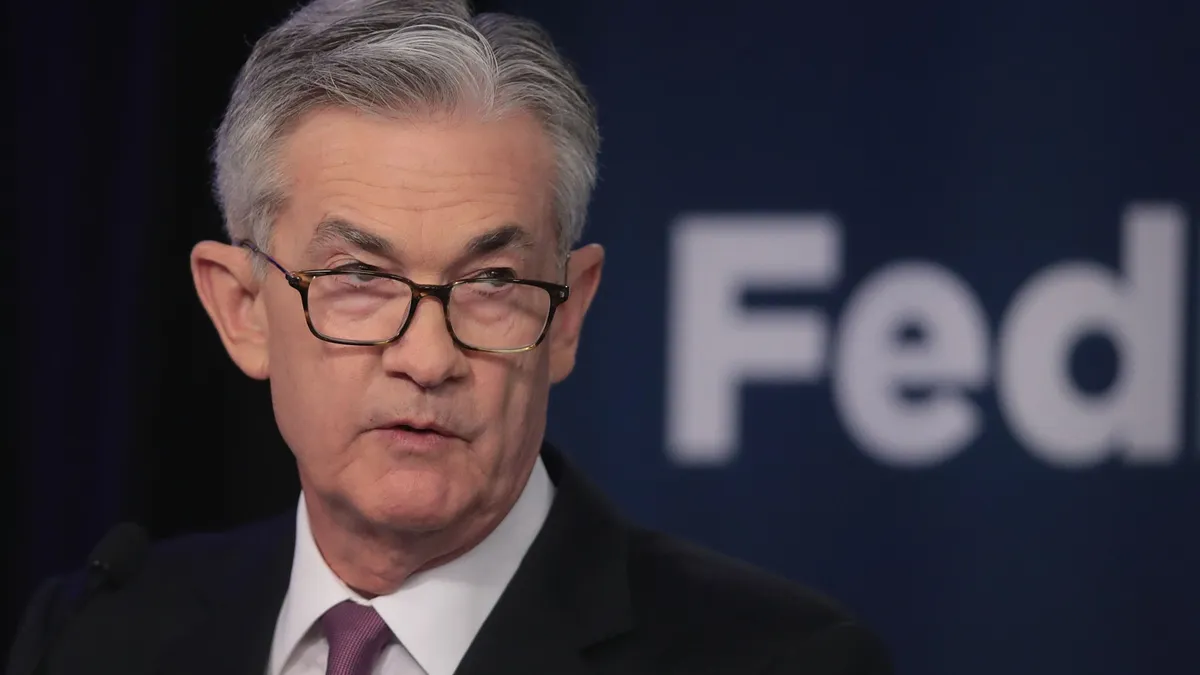Dive Brief:
- The Federal Reserve has made a policy shift and begun considering the best time to soften its effort to reduce inflation to 2% and begin trimming the main interest rate from a 23-year high, Fed Chair Jerome Powell said.
- “I’ve said that we wouldn’t wait to get inflation to 2% to cut rates,” Powell said in an interview with CBS’s “60 Minutes” broadcast Sunday. “We’re actively considering now going forward cutting rates, and on a 12-month basis inflation, you know, is not at 2% — it’s between 2-3% — but it’s moving in a way that gives us some comfort.”
- Powell said the Fed aims to balance the risk between easing too soon, and allowing inflation to rebound, and keeping borrowing costs high too long at the risk of triggering a downturn and widespread unemployment. Referring to inflation, he said, “we just want to gain a little more confidence that it’s coming down in a sustainable way toward our 2% goal.”
Dive Insight:
Central bank policymakers on Wednesday held the federal funds rate at a range between 5.25% and 5.5% and said they need to see more signs in coming weeks that inflation is steadily falling.
Powell, who was interviewed by CBS on Thursday, reaffirmed that he believes the Fed will not begin cutting borrowing costs at their next scheduled meeting March 19-20. He also said policymakers expect that inflation will continue to slow during the first six months of 2024.
The day after Powell spoke, data showed that strength in the labor market last month exceeded even the brightest forecasts. Employers in January added 353,000 jobs, the Labor Department said on Friday, in the biggest burst in job creation in a year. The hiring tally for December was revised up to 333,000 from 216,000.
“The economy has continued to grow strongly, job creation has been high, unemployment is still, you know, bouncing around near 50-year-lows,” Powell said. “The labor market is very, very strong still.”
Hiring was robust despite tightening credit standards during the fourth quarter. U.S. banks reported tougher credit standards and lower demand for commercial and industrial loans, the Fed said Monday, describing findings of a quarterly survey conducted between Dec. 18 and Jan. 9.
Chicago Fed President Austan Goolsbee on Monday echoed the reluctance among his colleagues to declare that inflation is sustainably moving toward their goal.
“We’ve had seven months of really quite good inflation reports, right around or even below the Fed’s target,” he said in an interview with Bloomberg Television.
“So if we just keep getting more data like what we have gotten, I believe that we should be well on the path to normalization,” Goolsbee said.
Powell declined to proclaim that the Fed has achieved a so-called soft-landing for the economy, or curbed inflation without causing a recession or a surge in unemployment.
“I’m not prepared to say that yet,” he said. “We have work to do on this.”
While at first declining to discuss the national debt, Powell said that “the U.S. federal government is on an unsustainable fiscal path, and that just means the debt is growing faster than the economy.”
“It’s probably time, or past time, to get back to an adult conversation among elected officials about getting the federal government back on a sustainable fiscal path,” he said, noting “we’re borrowing from future generations.”
Powell sought to dispel any notion that politics influences monetary policy.
“We do not consider politics in our decisions — we never do and we never will,” he said. “Integrity is priceless and, at the end, that’s all you have.”
Only one month into an election year, Powell faces congressional pressure to reduce borrowing costs early in 2024.
“For working Americans and small businesses who already feel the crush of inflation, higher housing costs and reduced access to credit will only make it worse,” Senate Banking Committee Chair Sherrod Brown (D-Ohio) said in a Jan. 30 letter to Powell.
“Keeping interest rates high will be detrimental to American workers and their families and do little to bring down prices or promote moderate economic growth,” Brown said. “It is becoming increasingly evident that restrictive monetary policy is no longer the right tool for combating inflation, and I urge the Federal Reserve to ease monetary policy early this year.”












